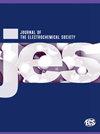回顾--电化学抛光的原理和应用
IF 3.3
4区 工程技术
Q2 ELECTROCHEMISTRY
引用次数: 0
摘要
电化学加工(ECM)是一种高效、精确的制造技术,具有广阔的应用前景。作为电化学加工的一个分支,电化学抛光 (ECP) 是一种先进的表面精加工方法,它利用电化学原理在各种材料(尤其是金属)上加工出光滑、反光的表面。这种工艺的特点是能够在不造成划痕或其他形式机械损伤的情况下精加工表面,因此与传统的机械抛光技术相比具有显著优势。ECP 的加工效率高,特别适用于需要大规模生产和高质量表面抛光的行业。本研究回顾了 ECP 的基本原理,比较了三种机理:粘性膜理论、盐膜理论和增强氧化-溶解平衡理论。此外,它还研究了影响 ECP 效果的因素,包括电解液成分、温度、电解抛光时间、电压和电流。报告还探讨了 ECP 在不锈钢、铜、镍和钨中的应用,并总结了 ECP 与先进技术的整合。最后,还讨论了 ECP 的未来发展前景。本文章由计算机程序翻译,如有差异,请以英文原文为准。
Review—Principles and Applications of Electrochemical Polishing
Electrochemical machining (ECM) is an efficient and precise manufacturing technology with broad prospects for numerous applications. As a subset of electrochemical machining, electrochemical polishing (ECP) is an advanced surface finishing method that utilizes electrochemical principles to produce smooth and reflective surfaces on various materials, particularly metals. This process is distinguished by its ability to refine surfaces without causing scratches or other forms of mechanical damage, thereby providing a significant advantage over traditional mechanical polishing techniques. The high processing efficiency of ECP renders it particularly suitable for industries that demand large-scale production and high-quality surface finishes. This work reviews the fundamental aspects of ECP, comparing three mechanisms: viscous film theory, salt film theory, and enhanced oxidation–dissolution equilibrium theory. Furthermore, it examines the factors influencing the effectiveness of ECP, including electrolyte composition, temperature, electropolishing time, voltage, and current. Applications of ECP in stainless steel, copper, nickel, and tungsten are also explored, along with a summary of its integration with advanced technologies. Finally, perspectives on the future development of ECP are discussed.
求助全文
通过发布文献求助,成功后即可免费获取论文全文。
去求助
来源期刊
CiteScore
7.20
自引率
12.80%
发文量
1369
审稿时长
1.5 months
期刊介绍:
The Journal of The Electrochemical Society (JES) is the leader in the field of solid-state and electrochemical science and technology. This peer-reviewed journal publishes an average of 450 pages of 70 articles each month. Articles are posted online, with a monthly paper edition following electronic publication. The ECS membership benefits package includes access to the electronic edition of this journal.

 求助内容:
求助内容: 应助结果提醒方式:
应助结果提醒方式:


